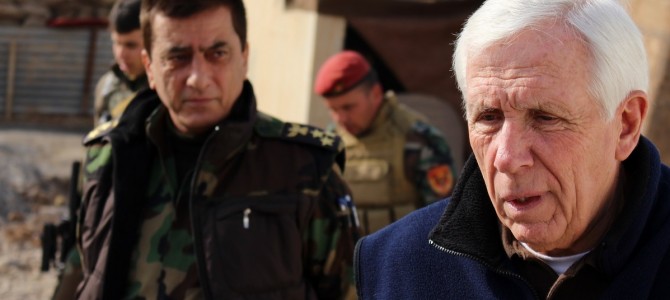
The 2016 election will be overrun with raucous debates on taxes, education issues, and health-care reform. But what about humanitarian issues and religious freedom? If the folks behind the brand-new 21st Century Wilberforce Initiative have anything to do with it, every politician vying for an office in 2016 will confront one of the issues that “poses a threat to all humanity” and “to create a world where everyone embraces religious freedom as a human right” in local townhalls and national debates in the months to come.
Religious Freedom Is in Crisis
With a razor-sharp memory, dry wit, and unmatched zeal for human-rights, former Rep. Frank Wolf, left behind 30 years in Congress to propel religious freedom to the forefront of the cultural and political landscape and to “fulfill the burning desire of my heart.”
From the fire chief in Atlanta who was fired because he expressed religious beliefs to the Christians being targeted and murdered in Iraq, Wolf says “defenseless religious communities are facing an existential crisis, which threatens their very survival in the lands they have inhabited for centuries.”
Indeed, although people of faith in America face a milder religious freedom crisis, in Iraq, Wolf met Christians in a community that included people who were forced to leave their country or die because of their faith. This has reduced the Christian Iraqi population from 1.5 million to 300,000.
An essay on the Wilberforce Initiative web site describes a chilling scene in Nigeria, Africa, where, just four days before the January Islamic terrorist attacks on the French magazine Charlie Hebdo, jihadist terror group Boko Haram carried out “its deadliest attack to date,” specifically targeting Christian churches and killing more than 2,000 people. While the attack was reported in America, it wasn’t given anything near the attention of the Paris attack on the French secular press, which was much smaller in scale.
Wilberforce: A Conduit for Change Then and Now
Meeting people who had experienced this type of religious discrimination and atrocities compelled Wolf to found and model the initiative after William Wilberforce, the English politician who worked for nearly 20 years to abolish slavery. As Wilberforce acted due to his faith, so too does Wolf’s faith empower and mobilize him.
“Ecclesiastes 4:1 says ‘I saw the tears of the oppressed, with no one to comfort them. The oppressors have great power, and their victims are helpless,’” Wolf says. “I see oppression people around the world are faced with, and my faith tells me to respond to this, to try to spread religious freedom.”
The initiative is not completely foreign from the work Wolf did in office, but rather an appropriate extension. The 76 year-old gained a reputation in office for championing human rights and religious minorities around the world—he once snuck into Tibet to advocate for the Dali Lama and spoke to persecuted Christians in Iraq as recently as January.
Wolf was equally known for his bipartisan work in support of transportation and jobs legislation (to the chagrin of some Republicans). He hopes his reputation for standing up for religious freedom and reaching across the political aisle will garnish support among his political colleagues, and spread the word among concerned Americans who can support this cause.
Not the Typical Washington Think Tank
Despite his obvious political connections, Wolf believes religious freedom ultimately transcends politics and says the venue to spread the issue will be outside the political sphere. He says Wilberforce ultimately abolished slavery not because of more likeminded people in Parliament, but because people outside Parliament put pressure on them.
“We’re not a think tank,” Wolf says with confidence. “We’re a do tank.”
That said, their first plan of action, Wolf says, “is to make the issue of religious freedom one of the major issues in the 2016 election.” He likened the issue and its importance to a surfer catching a wave. “If we miss this wave, we may not get another one.” The initiative’s co-founder and president is Randel Everett, pastor and founder of The John Leland Center for Theological Studies. The men have orchestrated a team of pastors, writers, professors, theologians, and attorneys to help educate people about and advocate for religious freedom.
Although Americans “are facing their own economic, moral and spiritual depravity, if we can show the American people what’s taking place [around the world] they will care,” Wolf says. Along with central advocacy surrounding the 2016 election, the initiative plans to provide faith-based human-rights training for religious leaders and organize conferences for leaders showing how they can better advocate the issue in their own countries.
This kind of education would even aid in situations like the current debate surrounding the Religious Freedom Restoration Acts (RFRAs) that recently passed—and set off firestorms—in Indiana and Arkansas. Wolf is more frustrated at the lack of knowledge than hopeless at what the outrage on religious freedoms seems to indicate.
He hopes his initiative will help average citizens, aspiring politicians, and leaders worldwide to take a stand on religious freedom, whether for an RFRA bill or requesting the release of an American imprisoned because of his faith, such as Pastor Saeed Abedini.
“We haven’t gone to bat for our people in a long time,” he says, with a sigh. Still, Wolf remains hopeful.
With five kids and 16 grandkids, hasn’t Wolf considered retiring near a golf course like many in his position might after three decades worth of political work? “I don’t golf,” he says bluntly, and there’s too much at stake for such trivial pursuits. As the pastor, martyr, and World War II-era spy Dietrich Bonhoeffer said, “Silence in the face of evil is itself evil: God will not hold us guiltless. Not to speak is to speak. Not to act is to act.”









